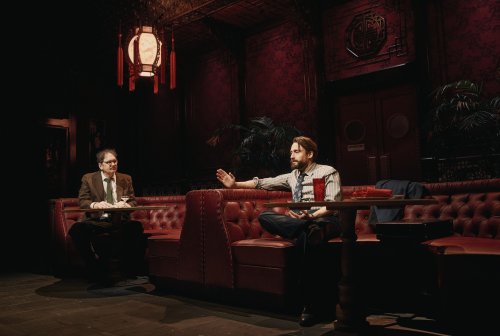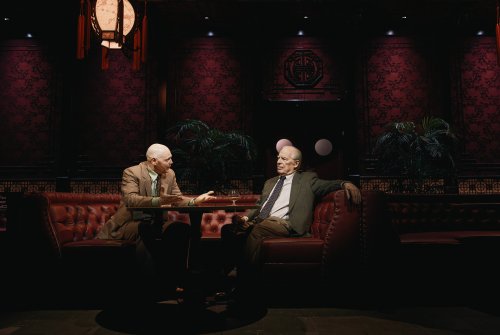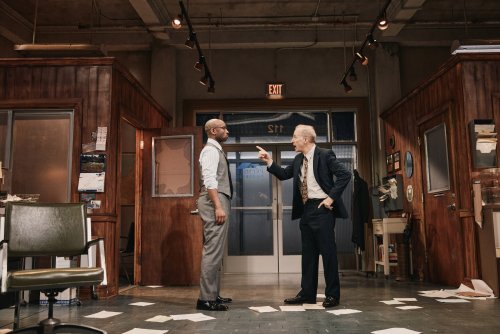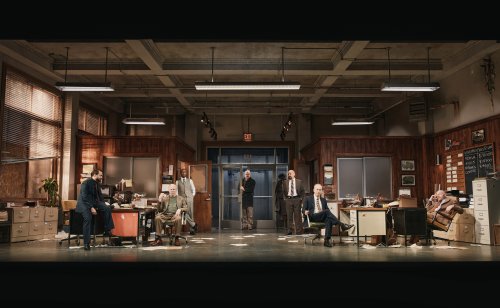Glengarry Glen Ross
David Mamet's masterpiece returns to Broadway with famous actors and self-defeating ambition.

John Pirruccello and Kieran Culkin in a scene from David Mamet’s “Glengarry Glenn Ross” at the Palace Theatre (Photo credit: Emilio Madrd)
The new Broadway revival of David Mamet’s Pulitzer Prize-winning Glengarry Glen Ross is a misguided dramatic test of the belief that comedy is tragedy plus time, reimagining the real estate bottomfeeders preying on their customers and each other in Mamet’s Reagan-era masterpiece as being more deserving of yuks than yucks. As self-defeating as the shady Chicago salesmen it depicts, director Patrick Marber’s unconventional approach drains any feeling of contempt or sympathy for these hollowed-out foot soldiers of deregulated capitalism, as they try to muster whatever toxic testosterone remains in their aging nutsacks to scam the next sucker. Especially when spoken about as if it were a noble pursuit, there is certainly dark humor to be found in this wretched scenario, but, first and foremost, it should shake your soul.
With one exception, however, Marber’s cast of notable wisecrackers treats Mamet’s punchy dialogue solely like punchlines, even when they’re face down on the canvas. As Shelley “The Machine” Levene, a loser among losers, Bob Odenkirk opens an Act I triptych of two-handers that are all set within a capacious Chinese restaurant, nonsensically designed by Scott Pask to indicate a gigantic establishment apparently getting along just fine serving no more than a couple of liquid-lunchers at a time. On the verge of being fired for bringing up the rear in a sales contest for a shiny new Cadillac–that old-timey signifier of virile American success–Levene tries to sweatily sweet-talk the best leads from Donald Webber, Jr.’s insensate office manager, a pleading effort that quickly devolves into a pathetic attempt at bribery.

Bill Burr and Michael McKean in a scene from David Mamet’s “Glengarry Glenn Ross” at the Palace Theatre (Photo credit: Emilio Madrd)
Odenkirk proves himself capable of summoning Levene’s fear, arrogance, desperation, and anger in sequence but not simultaneously as Alan Alda delicately pulled off in a sterling 2005 production of Mamet’s work. Despite the nostalgic expectations of audiences and, therefore, producers, Alda also confidently abandoned the comedic tics of his ubiquitous small-screen character, Hawkeye Pierce, while there’s little daylight between Odenkirk’s Shelley Levene and the risible rogue, Saul Goodman (née Jimmy McGill), Odenkirk portrayed for over a decade across a pair of hit television series.
But Odenkirk still fares far better than Bill Burr and Kieran Culkin who each entirely fall back on the tried-and-true. Separately anchoring the second and third panels of the triptych, their characters offer pungent variations on Mamet’s obsession with fallen masculinity, though at least one of these Boschian figures is supposed to be thoroughly at ease after the descent. That’s not Bill Burr’s Dave Moss, a rageaholic scheming to steal the real estate leads in unwilling cahoots with his rationally despondent colleague, George Aaronow (Michael McKean), who simply accepts that the world is rigged against him and those he, in turn, must hoodwink. Given that a lot of Burr’s stand-up comedy is essentially shaking his fist at clouds, Moss would appear tailor-made for his futile aggressiveness. Unfortunately, it’s such typecasting that Burr feels completely divorced from the other actors, as if he’s doing a long, fractured bit and someone should hand him a microphone (the conspicuous Boston accent also is distractingly curious for a Midwestern guy).

Donald Webber, Jr. and Bob Odenkirk in a scene from David Mamet’s “Glengarry Glenn Ross” at the Palace Theatre (Photo credit: Emilio Madrd)
Meanwhile, as Richard Roma–the play’s top dog in the sales contest–Culkin is, in a thespian way, the Shelley Levene of Marber’s Glengarry Glen Ross: a guy trying very hard to finish last. A veteran of the hand-through-the-floppy-hair school of acting, Culkin cannot relax into the cool, calm, and collected Nietzschean vibes that allow Roma to transcend the moral hang-ups of his fellow human beings, so that he can incomparably screw them hard. Whereas Roma, arguably Mamet’s most rivetingly repellant theatrical creation among a bevy of contenders, could convince a dead man to acquire life insurance, Culkin invariably seems like a hustler who should be wearing a sandwich board over his discount suit.
Since Culkin can’t sell Roma to us, we don’t believe the putative pigeon (John Pirruccello) Roma’s schmoozing during the triptych coda would ever succumb to Roma’s line of bull, which makes it shocking when said pigeon shows up at the real estate agency in Act II, at his wife’s behest, to back out of his rash Florida land purchase. The only plausible explanation is that the pigeon is, in fact, the serene sociopath, while the cheat is somehow being cheated. But that’s a different Mamet story.

Kieran Culkin, Michael McKean, Donald Webber, Jr., John Pirruccello, Howard W. Overshown, Bob Odenkirk and Bill Burr in a scene from David Mamet’s “Glengarry Glenn Ross” at the Palace Theatre (Photo credit: Emilio Madrd)
Frustratingly, Culkin is much more of a shrinking presence in the play’s second half, projecting nothing but nervous energy around the weak men he purportedly dominates. It’s a head-scratching performance that conjures the fantasy of an impromptu re-casting of Culkin’s part with McKean, the only big-name actor in the ensemble who, while reservedly tickling Marber’s inexplicable funny bone, nonetheless comprehends he’s in Mamet’s brutally hopeless world. Though, to be fair to Culkin, Glengarry Glen Ross would be markedly improved if McKean took on any of the other main roles. The revival might even be an outright phenomenon if McKean did Glengarry Glen Ross as a solo production, just not in the style of the visually exhausting The Picture of Dorian Gray, right now bombarding senses on Broadway thanks to Culkin’s Succession co-star, Sarah Snook, who spends the show whirling between camera operators and running underneath floating screens. The perfect model is actually what Andrew Scott currently accomplishes through ingenuity instead of technology in a touching adaptation of Anton Chekhov’s Uncle Vanya. So, here’s the deal: McKean, all by his lonesome, in a version of Glengarry Glen Ross that’s inspired by Scott’s beautiful simplicity–yes, that would be worth buying.
Glengarry Glen Ross (through June 28, 2025)
Palace Theatre, 160 West 47th Street in Manhattan
For tickets, visit http://www.glnegarryonbreoadway.com
Running time: one hour and 45 minutes including one intermission






Leave a comment